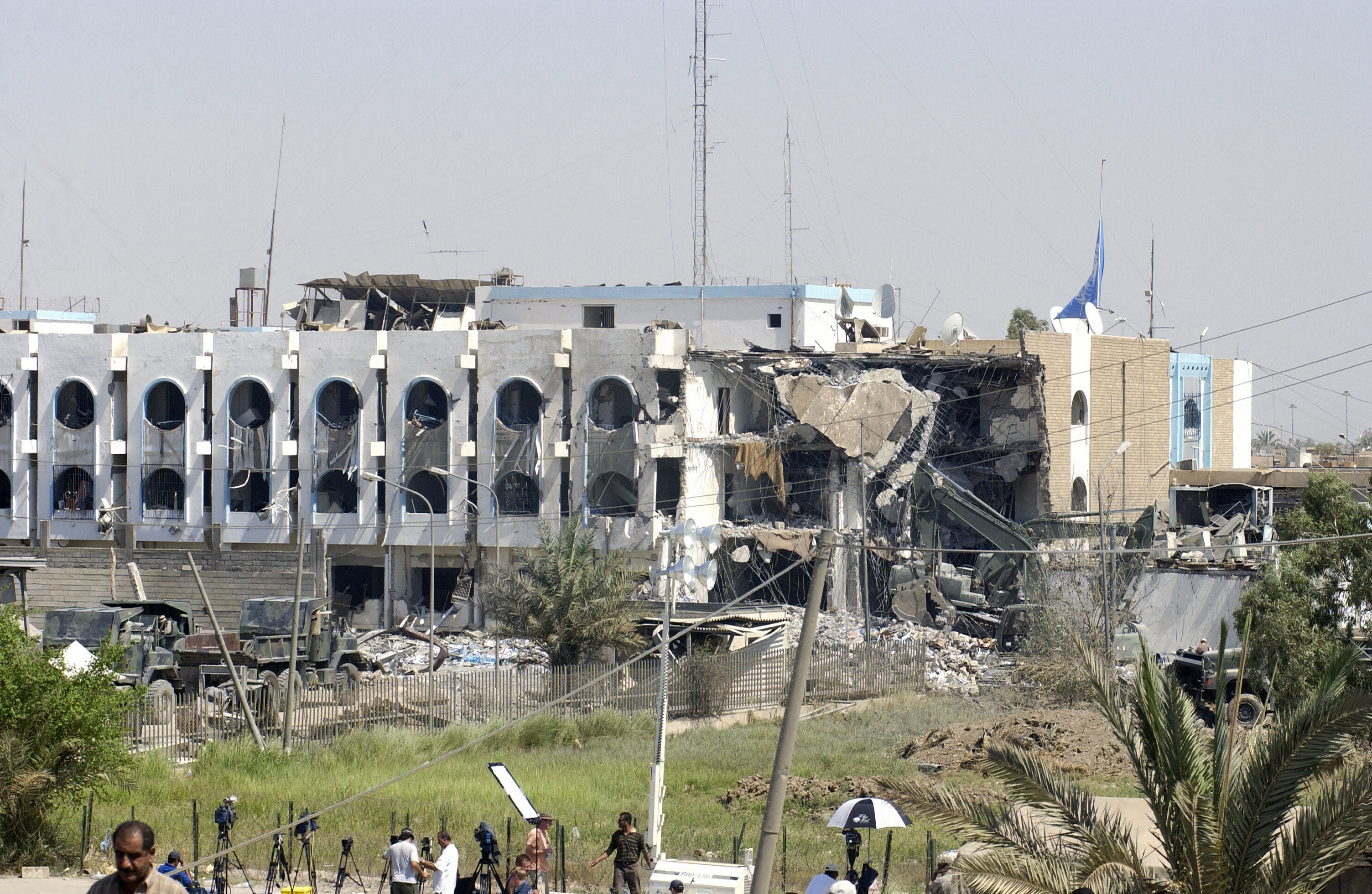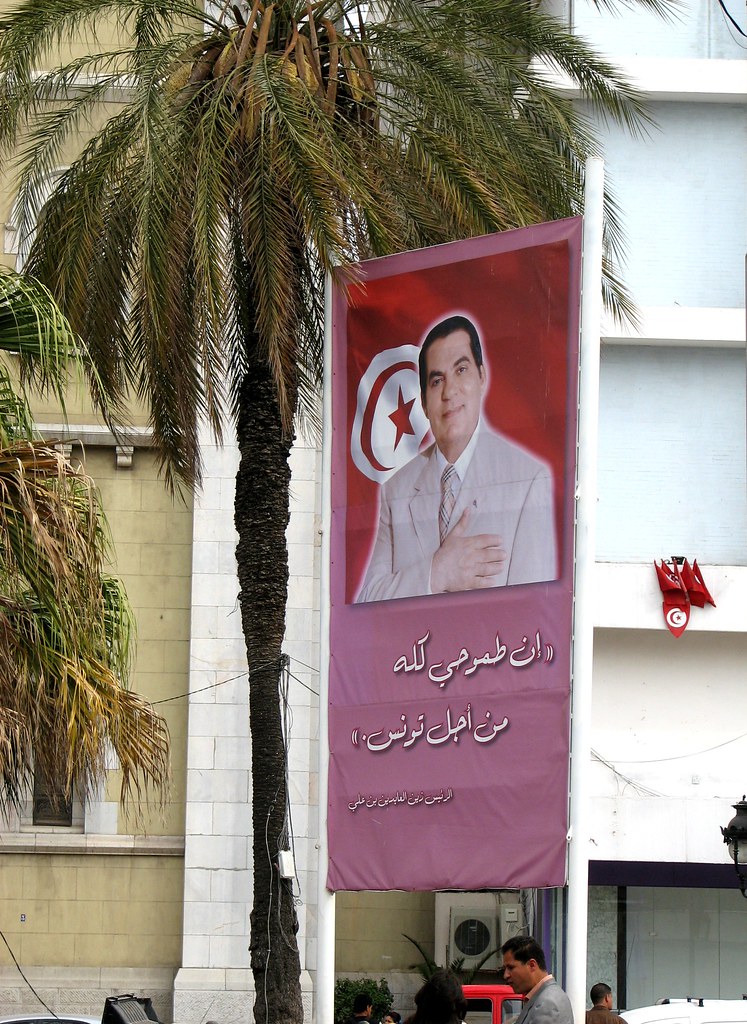 The death toll has risen to 155 and the wounded to 500 from two synchronized bombings in Baghdad Sunday morning that targeted the Ministry of Justice and the Baghdad Provincial Administration complex, just blocks from an August 19 truck bombing at the Ministry of Finance that killed 95. Pictures of the council complex show blown window panes revealing a gutted, blackened interior, making this one of the deadliest bombings in Iraq since the summer of 2007. On Monday morning another car bombing near Karbala, about 60 miles southwest of Baghdad, killed three and wounded five at a security checkpoint. This series of bombings comes as Prime Minister Nouri al-Maliki begins campaigning for reelection in January on a reputation of having guided Iraq past the worst of the violence that marked the years 2006 and 2007 and into a new phase of national unity and growth. Indeed Maliki had ordered the security blast walls surrounding Baghdad’s ministries moved closer to the buildings, permitting greater freedom of movement in the congested city and normalizing daily life. In response to Sunday’s bombings, Iraqi security forces have now closed most streets downtown, began conducting enhanced checkpoint searches, and are seeking international support in the criminal investigation of the attack. No one has yet claimed responsibility for the bombing, though authorities and outside analysts suspect Sunni insurgents affiliated with al Qaeda in Iraq. The bombings again raised serious concerns about how checkpoint security officials could allow two cars packed with hundreds of pounds of explosives into the city. The Washington Post assesses the bombings as “aimed at destroying faith in Prime Minister Nouri al-Maliki’s ability to secure the country as the United States withdraws.”
The death toll has risen to 155 and the wounded to 500 from two synchronized bombings in Baghdad Sunday morning that targeted the Ministry of Justice and the Baghdad Provincial Administration complex, just blocks from an August 19 truck bombing at the Ministry of Finance that killed 95. Pictures of the council complex show blown window panes revealing a gutted, blackened interior, making this one of the deadliest bombings in Iraq since the summer of 2007. On Monday morning another car bombing near Karbala, about 60 miles southwest of Baghdad, killed three and wounded five at a security checkpoint. This series of bombings comes as Prime Minister Nouri al-Maliki begins campaigning for reelection in January on a reputation of having guided Iraq past the worst of the violence that marked the years 2006 and 2007 and into a new phase of national unity and growth. Indeed Maliki had ordered the security blast walls surrounding Baghdad’s ministries moved closer to the buildings, permitting greater freedom of movement in the congested city and normalizing daily life. In response to Sunday’s bombings, Iraqi security forces have now closed most streets downtown, began conducting enhanced checkpoint searches, and are seeking international support in the criminal investigation of the attack. No one has yet claimed responsibility for the bombing, though authorities and outside analysts suspect Sunni insurgents affiliated with al Qaeda in Iraq. The bombings again raised serious concerns about how checkpoint security officials could allow two cars packed with hundreds of pounds of explosives into the city. The Washington Post assesses the bombings as “aimed at destroying faith in Prime Minister Nouri al-Maliki’s ability to secure the country as the United States withdraws.”
International nuclear inspectors have arrived at the recently disclosed Iranian nuclear facility near Qom to assess whether the facility is used strictly for peaceful purposes. The inspectors were originally scheduled to leave Tehran on Tuesday but an Iranian MP suggested they might leave late Monday. The IAEA inspectors began their work as Iran was considerating a proposal to export its low-enriched uranium (LEU) for processing in Russia and France before being returned to Iran as medical isotopes. Iran initially agreed to the proposal in principle and, though it missed Friday’s deadline for a formal response, Foreign Minister Manouchehr Mottaki suggested Monday Iran would likely formally accept the proposal sometime this week. How much of its uranium it agrees to export, and at what rate, is still an open question. Iran is expected to meet again with the five permanent members of the U.N. Security Council plus Germany, known as the P5+1 nations, before November 1. The New York Times reports there are internal tensions within both the American and Iranian government caused by the current proposal.
 Uruguay’s presidential election is headed toward a runoff after an ex-guerrilla fell short of the 50 percent needed for a victory over the nation’s former president. Jose Mujica, a candidate with the Broad Front party, appears to have received around 48 percent of the vote, while his opponent, Luis Lacalle of the conservative National Party, won some 30 percent. Even though votes are still be tallied, media exit polls show neither able to gain a majority without a runoff. With a Mujica victory, it is likely he would continue the socialist-leaning policies of outgoing President Tabare Vazquez. And it would be a remarkable story. Mujica was a founder of the Tupamaros, a rebel movement that tried to wrest power from the Uruguayan dictatorship throughout the 1970s and 1980s. Mujica has been shot nine times, was jailed three times and finally released in 1985. But he is not just a revolutionary, he is also a former agricultural minister. Lacalle, who was Uruguay’s president from 1990 to 1995, supports free markets and would push for cuts in government and taxes if he is re-elected. A runoff is scheduled for November 29.
Uruguay’s presidential election is headed toward a runoff after an ex-guerrilla fell short of the 50 percent needed for a victory over the nation’s former president. Jose Mujica, a candidate with the Broad Front party, appears to have received around 48 percent of the vote, while his opponent, Luis Lacalle of the conservative National Party, won some 30 percent. Even though votes are still be tallied, media exit polls show neither able to gain a majority without a runoff. With a Mujica victory, it is likely he would continue the socialist-leaning policies of outgoing President Tabare Vazquez. And it would be a remarkable story. Mujica was a founder of the Tupamaros, a rebel movement that tried to wrest power from the Uruguayan dictatorship throughout the 1970s and 1980s. Mujica has been shot nine times, was jailed three times and finally released in 1985. But he is not just a revolutionary, he is also a former agricultural minister. Lacalle, who was Uruguay’s president from 1990 to 1995, supports free markets and would push for cuts in government and taxes if he is re-elected. A runoff is scheduled for November 29.
In the first address to the Diet by a liberal Japanese leader in half a century, Prime Minister Yukio Hatoyama said he wants a relationship of equals with the United States and vowed to revive the Japanese economy. In discussing his foreign policy before a meeting with President Barack Obama next month, Hatoyama said that “being equal means a relationship in which Japan can also actively propose roles and concrete actions that the Japan-U.S. alliance could perform for global peace and security.” He called that alliance the “foundation” of efforts to secure peace. He also said he would discuss the 47,000 U.S. troops stationed in Japan, an issue that has riled some Japanese due to the fear of accidents from aircraft near the base and crimes that have been committed by American personnel. Another long-standing issue Hatoyama said he would address is a debate over four Pacific islands that Russia occupied in the days before the end of World War II that has been a sticking point between the two countries.
 Monday’s election results confirmed Tunisian President Zine al-Abidine Ben Ali won a fifth five-year term, tallying between 84 percent and 99 percent of votes in each province during Sunday’s election, Reuters reports, adding that many voters in Sunday’s election said the president deserved another term because he had made Tunisia into one of the region’s most stable and prosperous countries. Still, other reports suggested that Tunisians abstained in apathetic resignation. Since Ben Ali rose to the presidency in 1987 he has built a reputation for repression, which has helped deter Islamic extremism but has also suppressed democracy, as well as for modeling regional economic growth, social welfare, and gender liberalization in the Arab world. Tunisia is expected to apply next year for “advanced status” with the European Union, opening its trade and enhancing its international standing. Ben Ali threatened late Saturday to retaliate against any who questioned the election’s legitimacy, a threat at least in part to avoid any criticism of the election potentially affecting Tunisia’s application to the EU.
Monday’s election results confirmed Tunisian President Zine al-Abidine Ben Ali won a fifth five-year term, tallying between 84 percent and 99 percent of votes in each province during Sunday’s election, Reuters reports, adding that many voters in Sunday’s election said the president deserved another term because he had made Tunisia into one of the region’s most stable and prosperous countries. Still, other reports suggested that Tunisians abstained in apathetic resignation. Since Ben Ali rose to the presidency in 1987 he has built a reputation for repression, which has helped deter Islamic extremism but has also suppressed democracy, as well as for modeling regional economic growth, social welfare, and gender liberalization in the Arab world. Tunisia is expected to apply next year for “advanced status” with the European Union, opening its trade and enhancing its international standing. Ben Ali threatened late Saturday to retaliate against any who questioned the election’s legitimacy, a threat at least in part to avoid any criticism of the election potentially affecting Tunisia’s application to the EU.